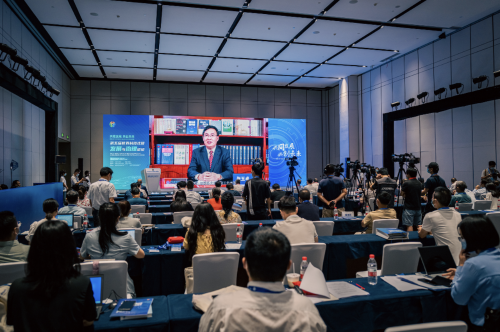-
5th Forum on Development and Governance of World Science and Technology Societies held in Changsha
2022-06-27
The 5th Forum on Development and Governance of World Science and Technology Societies, part of the 24th Annual Meeting of the China Association for Science and Technology (CAST), was held in Changsha of Hunan Province on June 25, 2022.
The 5th Forum on Development and Governance of World Science and Technology Societies is held in Changsha of Hunan Province on June 25, 2022.
Under the theme of “Joint development for a shared future”, the forum aims to promote in-depth exchanges and cooperation of sci-tech societies both at home and abroad for further development.
Zhang Yuzhuo, secretary of the leading Party members group, vice president in charge of daily work, chief executive secretary of the Secretariat of CAST, and academician of the Chinese Academy of Engineering (CAE), delivered a video speech at the opening ceremony.
Zhang Zhuohua, vice chairman of the Hunan Provincial Committee of the Chinese People’s Political Consultative Conference (CPPCC) and president of Nanhua University, attended the opening ceremony and delivered a speech.
Zhang Guihua, member of the leading Party members group and executive secretary of the Secretariat of CAST, presided over the opening ceremony.
More than 400 people, including heads of prestigious sci-tech societies and international organizations, and experts specialized in study of governance of sci-tech societies, attended the forum both online and on spot.
Zhang Yuzhuo pointed out that sci-tech societies resulted from the socialization, organization and institutionalization of S&T activities, assuming important responsibilities of prospering academia, cultivating talents, promoting exchanges and deepening cooperation.
While noting that global sci-tech societies are trying to adapt to changes of the world and the times, Zhang said that CAST is willing to deepen cooperation with international peers to innovate and create a better future for human society.
Zhang stressed that sci-tech societies should focus on global sci-tech governance issues including carbon peaking and neutrality, human health, energy and environment, and make efforts to set agenda and formulate rules for major disciplines and provide sci-tech solutions to global challenges.
Zhang urged global sci-tech societies to jointly establish platforms for no barrier communication of diverse knowledge, to achieve more cooperations without prejudice and discrimination.
Zhang called on sci-tech societies to guide S&T in the direction for public’s good, conduct researches to prejudge rule conflicts, social risks and ethical challenges which might occur along with the advance of science and technology, and lead the reform of sci-tech governance towards common values and a better world for mankind.
Zhang Zhuohua recoginized sci-tech societies’ contributions in Hunan’s efforts in building the province a highland of advanced manufacturing industry, sci-tech innovation with core competitiveness and inland pilot of reform and opening-up to promote high-quality development pattern and boost the rise of central China and the development of the Yangtze River Economic Belt.
Zhang added that sci-tech societies in Hunan also played an important role in promoting sci-tech innovation, formation of a new development pattern, and integration of science, technology and economy.
Zhang promised that Hunan would uphold the principles of openness, inclusiveness and win-win cooperation to strengthen cooperation with local sci-tech societies for common development.
At the forum, Mu Rongping, president of the Chinese Association of Science of Science and S&T Policy, released 2022 Science & Technology Society Development Index (STSDI 2022), in which the indexes of the development of sci-tech societies were introduced and an evaluation system was established from 3 dimensions of governance, guidance and influence.
3,000 plus sci-tech societies from more than 70 countries and regions were profiled in world coordinate system from indexes of memberships, publications and setting awards, providing sci-tech societies with references for future direction and innovation path.
The forum invited Sudip Parikh, CEO of the American Association for the Advancement of Science (AAAS), Okimura Kazuki, honorary president of the Japan Science and Technology Agency (JST), Mei Hong, president of the China Computer Federation (CCF) and academician of Chinese Academy of Sciences (CAS), Sun Xianze, president of the Chinese Pharmaceutical Association, Saifur Rahman, president of the Institute of Electrical and Electronics Engineers (IEEE), Tareq Emtairah, director of the Energy Department of the United Nations Industrial Development Organization (UNIDO), Toni Allen, director of International Strategic Marketing and Engagement of the Institution of Engineering and Technology (IET), Philip Kisray, senior vice president and general manager for international education at Wiley and other heads and experts of prestigious sci-tech organizations to deliver keynote speeches on issues of promoting open and coordinated development and digital transformation of sci-tech societies, health services and green development, and addressing global challenges jointly.
Mao Ming, vice president and secretary general of the Chinese Mechanical Engineering Society (CMES), and academician of the CAS, presided over the keynote speech session.
The forum also set up a session for dialogue among heads of sci-tech societies both at home and abroad.
Liu Baoyan, president of the World Federation of Acupuncture Moxibustion Societies (WFAS) and president of the China Association of Acupuncture-Moxibustion, and Hua Ning, senior director of IEEE Asia Business Operations, Long Baoluo, director of IEEE China business operations, and other heads of sci-tech societies had a dialogue around the topics of sci-tech societies’ participation in global governance, going global strategies and assuming social responsibilities.
The presidents and secretaries general of relevant national societies of CAST, and relevant experts participated in the forum.
Tag: Department of Sci-tech Innovation, 24th Annual Meeting of CAST
